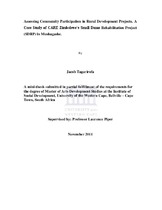Assessing community participation in rural development projects: A case study of CARE Zimbabwe's Small Dams Rehabilitation Project (SDRP) in Mushagashe
Abstract
The study sought to evaluate the challenges and opportunities for effective community participation in rural development projects in Zimbabwe through one case-study, and in turn to test the credibility of the popularized supposition that almost all contemporary development efforts characteristically embrace local participation. This matters as public participation is widely assumed to be an essential ingredient for the fruition of rural development efforts. The case examined was to achieve this aim. The research made use of quantitative and qualitative research methodologies in which various data gathering instruments were used. Among them were unstructured interviews, focus group discussions and questionnaires. The discussion and analysis of data was enabled by the use of People-Centered Development (PCD) as a conceptual framework. Among other findings, a key insight of the research was that the level of community participation in this case is not only minimal, but it is also top down. This has much to do with the negative perceptions by facilitating agents of local people as passive recipients of externally crafted models of development and other factors such as the power dynamics within and between the community and other stakeholders. The research also found out other obstacles that militate against effective participation such as preferential treatment of other tribal groups by the facilitating agent, intra group conflicts and bureaucratic and political influence. Based on these findings, and consistent with the wider literature, a key recommendation of the research is that the nature of community engagement should be based on the principle of equal partnership among all stakeholders as this would encourage full cooperation and thus effective participation.

